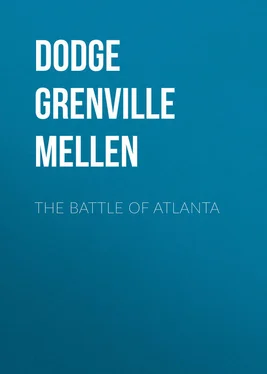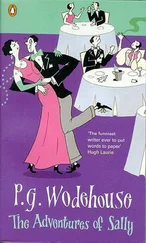Grenville Dodge - The Battle of Atlanta
Здесь есть возможность читать онлайн «Grenville Dodge - The Battle of Atlanta» — ознакомительный отрывок электронной книги совершенно бесплатно, а после прочтения отрывка купить полную версию. В некоторых случаях можно слушать аудио, скачать через торрент в формате fb2 и присутствует краткое содержание. Жанр: foreign_antique, foreign_prose, на английском языке. Описание произведения, (предисловие) а так же отзывы посетителей доступны на портале библиотеки ЛибКат.
- Название:The Battle of Atlanta
- Автор:
- Жанр:
- Год:неизвестен
- ISBN:нет данных
- Рейтинг книги:4 / 5. Голосов: 1
-
Избранное:Добавить в избранное
- Отзывы:
-
Ваша оценка:
- 80
- 1
- 2
- 3
- 4
- 5
The Battle of Atlanta: краткое содержание, описание и аннотация
Предлагаем к чтению аннотацию, описание, краткое содержание или предисловие (зависит от того, что написал сам автор книги «The Battle of Atlanta»). Если вы не нашли необходимую информацию о книге — напишите в комментариях, мы постараемся отыскать её.
The Battle of Atlanta — читать онлайн ознакомительный отрывок
Ниже представлен текст книги, разбитый по страницам. Система сохранения места последней прочитанной страницы, позволяет с удобством читать онлайн бесплатно книгу «The Battle of Atlanta», без необходимости каждый раз заново искать на чём Вы остановились. Поставьте закладку, и сможете в любой момент перейти на страницу, на которой закончили чтение.
Интервал:
Закладка:
While I was in command at Rolla I had organized by details from the Twenty-fourth and Twenty-fifth Missouri Regiments a Corps of scouts who lived in Northern Arkansas and Southern Missouri and were thoroughly acquainted with that country. During the day of the 6th of March, while Siegel was joining us and we were preparing for the battle, some of these scouts came to me and told me that Van Dorn proposed to move to our rear by this Little Cross Timber road. About 4 o'clock in the afternoon I went to General Curtis and reported these facts to him, and also told him of this road and of the feasibility of blockading it, supposing, of course, he would send some of the troops on his extreme right to do it; but he turned to me and said: "You take a portion of your command and go there and blockade the road."
It was after dark before I could reach the Little Cross Timbers, as I had to march infantry to the place, which was quite a distance away from where we were. I took six companies of the Fourth Iowa Infantry and one company of the Third Illinois Cavalry and marched to carry out this order. In the dark two of my companies crossed the road and got lost, while with the other five I got into Cross Timbers Hollows and spent about three hours felling trees all through the gorge, and only left when my cavalry reported the movement of Van Dorn's Army coming down the road. I returned to my camp supposing my two companies had been cut off, but upon discovering that the enemy were coming down the road they managed to get back across it and reached the camp.
I reported immediately to General Curtis's headquarters, and informed him that Van Dorn's Army was moving down that road to his rear. He did not believe it, and thought that I had mistaken some of his cavalry for Van Dorn's Army. There were no pickets out on our right flank, and I so reported to General Curtis, but evidently my report made no impression upon him, and I returned to camp.
Early on the morning of the 7th of March I received a request from General Curtis to report at a schoolhouse that was on the main Fayetteville road a half mile north of Sugar Creek, where I met all the commanders of Divisions, and, I think, some of the Brigade commanders, and where a council of war was being held as to the policy that was to be pursued. I was so confident that Van Dorn was in our rear that when I went to this council I took my Brigade and halted it on the road near where the council was to be held. Generals Siegel, Asboth, and a majority of the officers present, advised that we should fall back to Cassville towards Springfield, and not give battle there, but Colonel Jeff C. Davis and myself protested, and I stated that I believed a portion of Van Dorn's force was then in our rear. The rear of Curtis's Army was in a great deal of confusion; its trains were stretched out on the Fayetteville road and the ground that we were upon was wooded and not very defensible for a battle, unless they attacked us on the Sugar Creek front.
While we were in this council, about 8:30 a. m., scattered firing commenced in our rear near the Elkhorn Tavern, and General Curtis inquired what it was, and asked what troops those were that were out upon the road. I answered that they were mine, and he ordered Colonel Carr to immediately send me to the Elkhorn Tavern and ascertain what the firing meant.
Colonel Carr evidently was of the same opinion as myself, and accompanied me as I moved as rapidly as possible to the Elkhorn Tavern, where we went without being deployed right into battle; in fact, right into the enemy's skirmishers. The fact is, the first notice I had that the battle was on was when a shell fell among my drummers and fifers, who were at the head of my Regiment, and killed and demoralized them, so that we heard no more of drumming and fifing that day. I immediately deployed a company of the Fourth Iowa, which had been thoroughly drilled as skirmishers, and pushed forward toward the White River road, seeing some teams of the enemy passing that way with forage, and I pushed down the slopes of the Cross Timber Hollows nearly a mile before I developed the enemy in force.
The firing of the artillery and the sharp skirmish firing of my movement satisfied Colonel Carr that the enemy was in force in my front, and he immediately sent back word for his other Brigade, Commanded by Colonel Vandever, of the Ninth Iowa Infantry, to come to the rear, now our front. They had hardly reached the Elkhorn Tavern and deployed into line before Price's whole Army moved in on us in line of battle and disabled two of our batteries. The fighting on this front, with only Carr's two Brigades in line, the strength of both not exceeding three thousand men, was kept up continuously all day, until dark, with varying success.
As soon as I saw, near the middle of the day, the formation of the enemy, I knew that I could not hold the extended line we were covering, and I commenced drawing in my right and closing on Vandever until I backed down through an open field that had been cleared, and where the logs had been hauled to the lower edge of the slope to make a fence. Behind these logs I placed my Brigade and fought all the afternoon, with the enemy sometimes around both flanks and sometimes in my rear.
Colonel Vandever held his line at the Elkhorn Tavern in the edge of thick timber on the main Fayetteville road until late in the afternoon, fighting desperately, when the enemy, taking advantage of the timber as a blind, by largely superior numbers, drove him back across an open field to a line of woods in his rear and in my rear, which he successfully held. I was not aware of his movement until the fire in that direction slackened, and I sent out my adjutant, Lieutenant James A. Williamson (afterwards a Brevet Major-General), who returned and reported that the enemy were in possession of that field; in fact, he ran right into them and received their fire, but got back to me safely. It was then nearly dark. The fire on my front had slackened, and my Brigade was almost entirely out of ammunition. I immediately ordered them to form in column and led them right out from the right, moving in the direction where Vandever's Brigade had formed in its new position. As I moved out I passed right in sight of a column of the Confederate forces, who evidently had come out of the hollow and were forming to again attack Vandever. They probably thought I was a portion of their force, for they made no demonstration towards me, and I passed right by them. As I passed out into the open I could see that General Asboth, who had been brought there by General Curtis, was forming to attack at the Elkhorn Tavern again; and I met General Curtis, who seemed astonished to find me with my force intact. He asked me where I was going. I told him that I was out of ammunition, and that I was bringing out my force to form it on the new line. Paying the command a high compliment, he immediately ordered me to fix bayonets and to charge on the enemy at the same time that Asboth with his reinforcement moved down the Fayetteville road towards the Elkhorn Tavern. I immediately did this, and passed right back over the field where I had been fighting, but found no enemy. They had evidently left my front at the same time I retired, and I returned and went into line on the right of Vandever's Brigade, probably 500 feet in the rear of the original line, and there we laid all night under arms.
Van Dorn's plan of attack was to throw the Arkansas forces under McCullough and McIntosh on Curtis's right, facing the Little Cross Hollow road, while at the same time General Price with his force moved around us by the Little Cross Timber road to our rear and attacked from the Cross Timbers.
When passing through Little Cross Timber Hollow Price struck the timber blockade, and, as he shows in his report, was held there for a long time before he could clear out the roads and get his forces and artillery through. This delayed his attack in the rear until nearly 10 o'clock in the morning. The two forces of McCullough and Price were separated by a high ridge by the name of Pea Ridge, over which it was impracticable for them to connect, and, therefore, the two attacks were separate and not in concert.
Читать дальшеИнтервал:
Закладка:
Похожие книги на «The Battle of Atlanta»
Представляем Вашему вниманию похожие книги на «The Battle of Atlanta» списком для выбора. Мы отобрали схожую по названию и смыслу литературу в надежде предоставить читателям больше вариантов отыскать новые, интересные, ещё непрочитанные произведения.
Обсуждение, отзывы о книге «The Battle of Atlanta» и просто собственные мнения читателей. Оставьте ваши комментарии, напишите, что Вы думаете о произведении, его смысле или главных героях. Укажите что конкретно понравилось, а что нет, и почему Вы так считаете.












